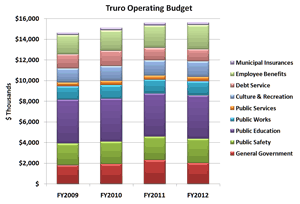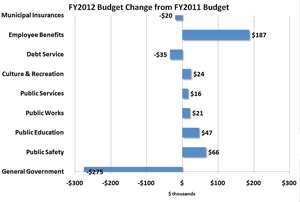About the Committee
Truro’s Finance Committee is composed of five members, appointed by the Town Moderator, who serve three-year terms. Current members include Phil Smith (Chair), Rachael Sokolowski (Vice-Chair), Paul Asher-Best (Clerk), Martha Nagy, and Lori Meads. As mandated by Massachusetts law, the Finance Committee functions as the town’s official fiscal watchdog. As such, the Committee’s primary responsibility is to study, analyze, and offer recommendations to the Town Meeting with regard to Truro’s Annual Budget, Capital Improvement Plan, and any other financial warrant articles, as well as to understand and monitor the process of setting the town tax rate. The Finance Committee must also review and approve all proposed reserve fund transfers for unexpected contingencies.
The Committee meets regularly, particularly this time of the year, as the Town budget is being developed and Town Meeting approaches. The Committee also participates in the operation of a budget task force, which was established several years ago to gain a better understanding of departmental spending and budget requests. The task force consists of two members of the Finance Committee, two members of the Board of Selectmen, the Town Administrator, and Town Accountant.
FY2012 Budget
The Committee will be discussing the Town Budget and other financial articles in the Town Meeting Warrant at Town Meeting on April 26th. In addition, the Committee’s Public Budget Hearing will be held at 6:30 p.m. just before Town Meeting.
The Warrant will include a letter from the Committee discussing the budget, other financial articles, the tax rate, and the general financial condition of the Town. Below are some excerpts from the letter.
"Article Four, the Omnibus Annual Budget Appropriation for FY2012 totals $15,606,766 which is nearly identical to the FY2011 budget of $15,576,954. The current budget contains a decrease of $130,800 in the Operating Capital Account, as compared to the prior year. These are items that have a useful life of several years, but whose dollar value is not large enough to warrant capital or debt exclusion status. Offsetting this decrease are increases in some other budget categories. Salaries have risen only modestly; and employee benefits, particularly group health insurance, continue to increase, following national trends. The “core” operating budget, excluding capital items, debt service and employee benefits and insurance, has increased by 1.2 %. Looking to the future, capital expenditures, as detailed in the Capital Improvement Budget in the Warrant, are projected to be higher in the next few budget years.
The Committee believes that the FY2012 budget is a good result, is prudent, and results in an appropriate delivery of goods and services to the taxpayers. The budget was constructed based on conservative guidelines issued by the Board of Selectmen and supported by the Committee. The budget will not require a Proposition 2½ override but does contain one $325,000 debt exclusion for the south jetty repair. This item will be funded over a period of several years.Town Revenues
The town derives its revenue essentially from two sources: the tax levy (or property tax) and fees and other revenue sources such as beach permits, excise tax, mooring fees, etc. The projected funds available from the tax levy after certain adjustments as prescribed by the Commonwealth for FY2012 is $12,357,676; the projected revenue from receipts and other sources is $5,059,629, giving the Town total projected revenue of $17,417,305. The current projected expenditures total is $17,448,589, which results in a minor shortfall. The projected expenditure total of $17,448,589 represents the Town’s operating budget of $15,606,766, plus the financial impact of all other Warrant Articles, and certain state and county charges.
The revenue projections have been developed carefully and conservatively but are quite obviously dependent upon the weather, tourism, reimbursements from the state, and economic conditions.
Tax Rate
For many years it has been the will of the townspeople that the Town maintain a low tax rate relative to other cities and towns within the Commonwealth of Massachusetts. The Committee believes this continues to be the case but wishes to point out the real estate taxes paid on the median single family home in Truro has increased at an annual rate of 6.1% during the past five years. This is essentially the cumulative result of financial Articles, including capital and debt exclusions that have been approved at Town Meeting and the Annual Election Ballot over the years.
Additionally, our low tax rate puts us in the position of relying heavily on fees and other revenues to balance the budget. Much of our fee revenue is based on tourism and related activities, and a shortfall in our future budgets could occur if these revenues decline. The Committee believes it is prudent to explore ways to broaden our sources of revenue, such as the Local Option Meals Excise Tax, which was approved at last year’s Town Meeting.
Warrant Articles Nine and Fourteen
The Committee would like to draw your attention to Warrant Articles Nine and Fourteen. One of the fastest growing expense categories for the Town is Group Health Insurance for employees and retirees. These expenses are accounted for on a “pay as you go” basis, and the Town, like most governmental entities, has set aside no funds for future health care payments to retirees. As a result, the Town has an actuarial “unfunded liability” of nearly $22 million, calculated as of 7/1/2008, and growing. Even though the Town and its employees have paid into the Medicare Trust Fund since 1986, Massachusetts law allows the Town to offer non-Medicare as well as Medicare plans and for Town retirees to have the option to enroll in either. More than half the Town’s retirees have chosen the non-Medicare option. Article Nine would require all eligible Town retirees and their families to enroll in Medicare Part B. The Town would then provide supplemental insurance, rather than a full private policy. Adoption of Article Nine would reduce the Town’s unfunded liability by as much as 50% by shifting millions of dollars of future health-care costs from Truro taxpayers to the federal government. The actuarial value of each retiree’s health-care benefits would not be impacted; and retirees would pay no more, and in some cases, less, in premiums. Article Fourteen would establish the mechanism by which the Town would begin to fund the currently unfunded liability.
Stabilization Fund
The town maintains a Stabilization Fund, in accordance with good fiscal management practices as outlined by the Commonwealth. It is recommended that all cities and towns maintain a Stabilization Fund equal to at least 5% of the annual budget. The current balance in our fund is $979,242, or approximately 6.3% of the town’s FY12 budget. Additionally, the Town maintains other reserve funds, including the Capital Improvements Trust Fund, which has a current balance of $337,122.
The Stabilization Fund balance, our relatively low tax rate, and an infrastructure that has been well maintained in recent years means that Truro is in relatively healthy financial condition compared with many other towns on Cape Cod. We should all take satisfaction from this situation, which is the result of prudent fiscal management in recent years. The Committee recommends continued due diligence to sustain this position.
Recommendations
The Committee, thereby, recommends that the Annual Town Meeting approve the Omnibus Annual Budget and other financial articles, including Articles Nine and Fourteen, for the 2012 fiscal year."
Finally, the Committee would like to commend the Town Energy Committee for its good work in helping to reduce the cost of energy, which is one of the larger town expenses.
We hope to see you all on April 26th, and we look forward to your questions and comments.

